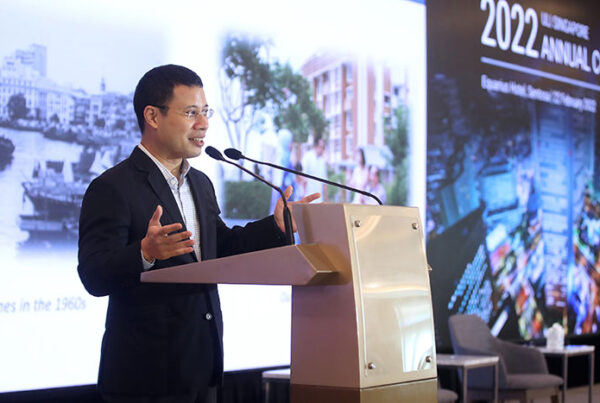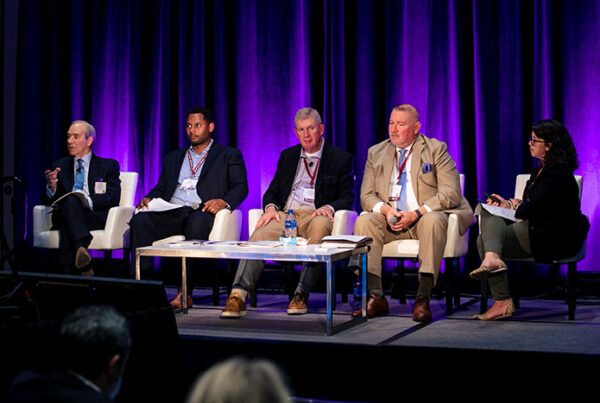Winners include projects in California, Idaho, Massachusetts, New York, Puerto Rico, Texas, and Washington.
The ULI Terwilliger Center for Housing has announced seven winning residential projects for the 2021 Jack Kemp Excellence in Affordable and Workforce Housing Awards, which will be celebrated at the ULI Fall Meeting in Chicago (October 11–14).
The awards honor exemplary developments that ensure housing affordability for people with a range of incomes, and specifically recognizes efforts by the development community to increase the supply of homes affordable to households earning less than 120 percent of the area median income (AMI).
“Congratulations to all of this year’s Kemp Awards winners,” said ULI Terwilliger Center for Housing executive director Christopher Ptomey. “The commitment and creativity that they have provided has enabled communities to meet critical housing needs in a uniquely challenging environment. Each of these projects demonstrates replicable approaches to delivering mixed-income residential developments, an important tool for meeting cities’ workforce housing needs.”
This year’s winners, selected from a record number of applications, are:
- A.O. Flats at Forest Hills, Jamaica Plain, Massachusetts—a highly sustainable LEED Platinum–certified, transit-oriented, mixed-income community built on a once-vacant Massachusetts Bay Transit Authority site. The building has 78 apartments, 1,600 square feet of retail space, and 2,500 square feet of community space to host resident amenities that include a business hub, fitness room, lounge, outdoor play area, dog walk, and bicycle storage. The development prioritized racial equity and inclusion through its contracting and hiring goals, and of the project’s total construction contract value, 38 percent went to Minority Business Enterprise (MBE) firms and 13 percent to Women Business Enterprise (WBE) firms.
- Ash+River Townhomes, Boise, Idaho—a development offering 34 units of workforce/moderate-income housing near the city’s fast-growing downtown. The design pays homage to the adjacent historic Hayman House, the 60-year residence of Emma Hayman and now a cultural site honoring the history of Black residents in the neighborhood. The development includes townhouses and flats, along with retail space, open space, and pedestrian-oriented amenities that include a local coffee vendor. The community is certified LEED Gold, and its energy-efficient construction translates into lower utility bills and healthier homes for residents.
- Bayshore Villas, San Juan, Puerto Rico—the first mixed-income development on the island, offering 174 apartments for market-rate, moderate-income, and low-income households. The development includes commercial space and a club room and fitness center, and was built to withstand tropical storm and allow residents to safely shelter in place. As the first mixed-income development in Puerto Rico, the developers worked extensively with the Department of Housing and the housing finance agency on mixed-finance transactions, providing the necessary groundwork that will now catalyze and facilitate further mixed-income developments on the island.
- La Placita Cinco, Santa Ana, California—a development that replaced an underused surface parking lot and gas station with a neighborhood that includes affordable housing, outdoor amenities, and a commercial center. In addition to providing much-needed housing, this development transformed an impermeable surface with landscaped areas and sustainable stormwater management facilities that retain and treat all runoff on site, as well as a new tree canopy and white roofs. New walkways and curb extensions also increased pedestrian safety and neighborhood connectivity.
- The Smile in Harlem, New York, New York—a large building with more than 200 units of mixed-income housing. The building’s facade gently slopes inward like a draped curtain, deviating from the hard, linear street edge. The Smile transforms a traditional street, creating visual connections between the streets to form a more cohesive neighborhood experience for residents and locals. Amenities include a rooftop with dining space and grills, a large screening area for movies, and views of Central Park and the Manhattan skyline.
The jury also recognized two housing developments with a Charman’s Award, a recognition bestowed on an especially creative project designed to address a unique affordable housing challenge:
- Arlington Drive Youth Campus, Tacoma, Washington—a development providing housing and services for youths and young adults who are experiencing homelessness, making the transition from foster care, or on the threshold of homelessness. The campus consists of a crisis residential center and a 58-unit apartment complex for homeless young adults, with about 30 percent of the residents being parents of babies or toddlers. The adjacent apartment complex provides apartments for previously homeless 18- to 24-year-olds. The Social Impact Center of the YMCA of Greater Seattle provides on-site supportive services. The young adults were included in the design process for the development of Arlington Drive Apartments.
- The St. John, San Antonio, Texas—the adaptive use of the former St. John’s Seminary College. Now home to 228 apartments, the property is within walking distance of the San Antonio River Walk as well as employment and commercial centers. It also is adjacent to a UNESCO World Heritage site whose archaeological mapping and preservation created challenges but also a unique opportunity to preserve a site with substantial historical and cultural significance while also delivering a high-quality housing project that will act as a catalyst for future development and economic growth. Further, the two Latino development team leaders reflect the community served and were directly involved in the community meetings and outreach.
Other finalists for the 2021 Kemp Awards were Casa Arabella, Oakland, California; Corsair Flats, Alameda, California; Gardner House, Seattle, Washington; Harlow Apartments, Washington, D.C.; Livonia Avenue Initiative, Brooklyn, New York; Orchards of 82nd, Portland, Oregon; Pendana at West Lakes, Orlando, Florida; Stylus and Siena Affordable Apartments at Civita, San Diego, California; and, Villas on the Park, San Jose, California.
ULI established the Jack Kemp Excellence in Affordable and Workforce Housing Awards in 2008, naming the program in memory of Jack Kemp, former secretary of the U.S. Department of Housing and Urban Development who had served as a Terwilliger Center national advisory board member. The awards are given annually to affordable and workforce housing developments that represent outstanding achievements in several areas, including affordability, innovative financing and building technologies, proximity to employment centers and transportation hubs, quality of design, and involvement of public/private partnerships. Developments competing for the Kemp Awards may be fully affordable, with all units designated for low- to moderate-income residents; or they may contain a mix of affordable and market-rate units.
The jury is chaired by Ron Terwilliger, founder of the ULI Terwilliger Center and chairman of Terwilliger Pappas Multifamily Partners. Other jury members are Payton Chung, managing partner, Westover Green, Washington, D.C.; Dennis Daniels, architect and project manager, Wier Boerner Allin Architecture, Nashville; Adam Ducker, chief executive officer, RCLCO, Bethesda, Maryland; Mike Francescani, manager, CohnReznick, Boston; Alan George, executive vice president (retired), Equity Residential, Chicago; Sonia Huntley, senior vice president of diversity, equity, and inclusion, ULI, Washington, D.C.; Dara Kovel, president, Beacon Communities, Boston; Dionne Nelson, principal and chief executive officer, Laurel Street Residential, Charlotte; Phillip Payne, co-founder and chairman, the Lotus Campaign, Charlotte; Mark Richardson, chief technology officer, Rich Analytics, Toronto; Stacy Silber, principal, LerchEarlyBrewer, Bethesda, Maryland; Jaydan Tait, president and chief executive officer, Attainable Homes Calgary, Calgary, Alberta; Emily Thompson, partner, GMD Development, Seattle; Sam Watkins, director of architecture, BKV Group, Dallas; and Margaret Wylde, chief executive officer, ProMatura Group, Oxford, Mississippi.


